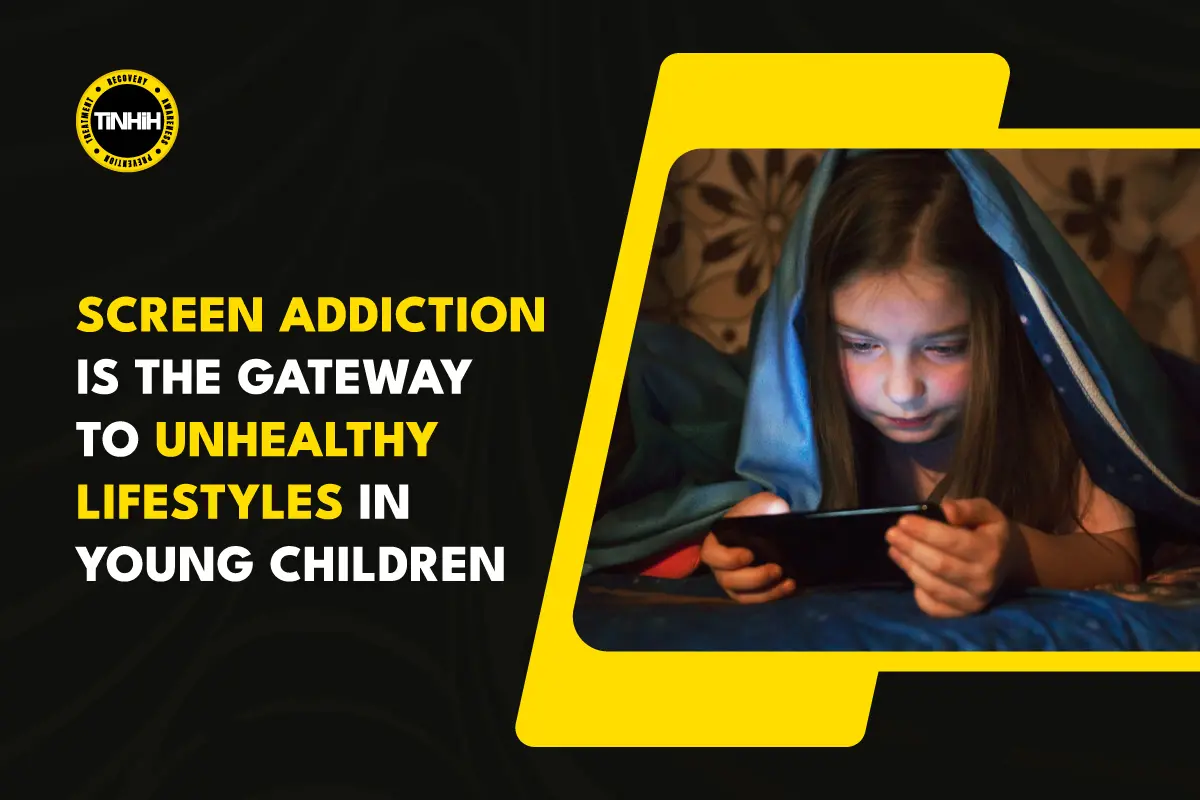
Screen Addiction: The Gateway to Unhealthy Lifestyles in Young Children

Screen addiction has become a growing concern among young children in today’s digital age. With the proliferation of smartphones, tablets, computers, and other electronic devices, children are spending more time than ever glued to screens. This pervasive habit not only poses immediate risks to their physical and mental health but also sets the stage for unhealthy lifestyles later in life.
Table of Contents
The Concept of Screen Addiction as a Gateway to Unhealthy Lifestyles
Screen addiction is more than just a harmless pastime; it can serve as a gateway to a host of unhealthy behaviors and lifestyles. Excessive screen time has been linked to a myriad of health issues, including obesity, poor sleep quality, and mental health disorders such as depression and anxiety. Moreover, children who are addicted to screens are more likely to adopt sedentary habits, make unhealthy dietary choices, and struggle with social and emotional development.
What Is Screen Addiction?
Screen addiction, also known as digital addiction or internet addiction disorder, refers to the compulsive and excessive use of electronic devices such as smartphones, tablets, computers, and televisions. In young children, screen addiction manifests as an inability to control or limit screen time, leading to detrimental effects on physical, mental, and emotional well-being.
Characteristics of Screen Addiction in Young Children May Include:
- Preoccupation with Screens: Children may constantly think about or desire to be in front of screens, often at the expense of other activities such as playing outdoors or interacting with peers.
- Withdrawal Symptoms: When separated from screens, children may exhibit withdrawal symptoms such as irritability, restlessness, and anxiety.
- Loss of Interest in Other Activities: Screen-addicted children may lose interest in hobbies, sports, and social interactions, preferring the solitary and immersive nature of screen-based activities.
- Continued Use Despite Negative Consequences: Despite experiencing negative effects such as declining grades, disrupted sleep patterns, or strained relationships, children may continue to engage in excessive screen time.
- Inability to Control Screen Use: Parents may struggle to set limits on screen time, and children may resist or disregard rules regarding screen usage.
Explanation of How Excessive Screen Time Can Lead to Addictive Behaviors
Excessive screen time can hijack the developing brain’s reward system, leading to addictive behaviors and detrimental effects on children’s health and well-being. Excessive screen time can lead to addictive behaviors in young children through various mechanisms:
- Dopamine Release: Screen-based activities such as gaming or social media trigger the release of dopamine, a neurotransmitter associated with pleasure and reward. Over time, children may develop a tolerance to these activities, requiring increasing amounts of screen time to achieve the same level of satisfaction.
- Reinforcement of Behavior: Screens offer instant gratification and feedback, reinforcing the behavior of screen use. Children learn to associate screens with positive experiences, making it difficult to resist the urge to engage in screen-based activities.
- Escapism and Avoidance: Screens provide an escape from reality and may serve as a coping mechanism for stress, boredom, or difficult emotions. Children may use screens as a means to avoid facing challenges or responsibilities in their lives.
- Social Influence: Peer pressure and social norms play a significant role in the development of screen addiction. Children may feel compelled to use screens excessively to fit in with their peers or maintain online social connections.
Common Screen Addiction Symptoms and Sign in Young Children
Recognizing screen addiction in young children requires an understanding of the common signs and symptoms associated with excessive screen time. While occasional screen use is normal, persistent and compulsive engagement with screens may indicate a deeper issue. Here are some common signs and symptoms to watch out for:
- Preoccupation with Screens: Children may constantly talk about or request screen time, displaying an intense desire to engage in screen-based activities.
- Difficulty Controlling Screen Use: Parents may find it challenging to set limits on screen time, and children may become irritable or defiant when denied access to screens.
- Withdrawal Symptoms: When separated from screens, children may exhibit withdrawal symptoms such as irritability, restlessness, or anxiety. They may also express a strong desire to return to screen-based activities.
- Neglect of Responsibilities: Screen-addicted children may neglect other responsibilities such as homework, chores, or personal hygiene in favor of screen time.
- Decline in Academic Performance: Excessive screen time can interfere with schoolwork and academic performance, leading to declining grades and difficulty concentrating in class.
- Social Isolation: Screen-addicted children may withdraw from social interactions with family members and peers, preferring solitary screen-based activities instead.
- Physical Health Problems: Prolonged screen time can lead to physical health issues such as obesity, poor posture, and eyestrain. Children may also experience headaches or sleep disturbances due to excessive screen use.
- Mood Swings and Emotional Dysregulation: Screen addiction can affect children’s emotional well-being, leading to mood swings, irritability, and difficulty managing emotions.
The Physical, Emotional, and Social Impacts of Excessive Screen Time
Excessive screen time can have profound effects on young children’s physical, emotional, and social well-being. It is essential to recognize these impacts to understand the severity of screen addiction and its potential long-term consequences.
Physical Health
Prolonged screen time is associated with a sedentary lifestyle, increasing the risk of obesity, cardiovascular problems, and musculoskeletal issues. Children who spend excessive time in front of screens are less likely to engage in physical activities essential for their overall health and development.
Emotional Well-being
Excessive screen time can impact children’s emotional health, leading to increased levels of stress, anxiety, and depression. Screen-addicted children may struggle with regulating their emotions and may use screens as a coping mechanism to escape from negative feelings.
Social Development
Screen addiction can hinder children’s social development by reducing opportunities for face-to-face interactions and meaningful connections with peers and family members. Children who spend excessive time on screens may have difficulty developing social skills such as communication, empathy, and cooperation.
Cognitive Development
Prolonged screen time can interfere with cognitive development, affecting attention, memory, and problem-solving skills. Children who spend too much time in front of screens may have difficulty concentrating in school and may experience delays in academic achievement.
ADHD and Screen Addiction
The relationship between Attention-Deficit/Hyperactivity Disorder (ADHD) and screen addiction in young children is complex and multifaceted. While not all children with ADHD develop screen addiction, there is a higher prevalence of excessive screen time among children diagnosed with ADHD compared to their neurotypical peers.
Several Factors Contribute to The Link Between ADHD and Screen Addiction:
- Sensory Stimulation: Screens provide a high level of sensory stimulation, which can be particularly appealing to children with ADHD who may seek out novel and stimulating activities to alleviate boredom or restlessness.
- Impulsivity: Children with ADHD often struggle with impulse control, making it challenging to regulate screen time and resist the immediate gratification offered by screen-based activities.
- Executive Functioning Deficits: ADHD is associated with deficits in executive functioning skills such as attention, planning, and self-regulation. These deficits can make it difficult for children to manage their screen time effectively and set appropriate limits.
- Hyperfocus: While children with ADHD may struggle with maintaining attention in certain tasks, they may also experience periods of hyperfocus, especially when engaged in highly stimulating activities such as video games. This hyperfocus can make it challenging for children to disengage from screens even when they recognize the negative consequences.
How Screen Addiction May Exacerbate Symptoms of ADHD
The interplay between ADHD and screen addiction can create a challenging cycle that perpetuates and exacerbates symptoms of both conditions. Recognizing this relationship is crucial for developing targeted interventions and support strategies to address screen addiction in children with ADHD and promote healthier screen habits. Screen addiction has the potential to exacerbate symptoms of ADHD and further impair children’s functioning in several ways:
- Attention Difficulties: Excessive screen time can exacerbate attention difficulties in children with ADHD, making it harder for them to focus on tasks that require sustained attention and concentration.
- Impulsivity: Screen addiction can reinforce impulsive behaviors in children with ADHD, as they may have difficulty regulating their impulses to engage in screen-based activities, even when it’s not appropriate or beneficial.
- Hyperactivity: While screens themselves may not cause hyperactivity, the sedentary nature of screen time can exacerbate hyperactive behaviors in children with ADHD by providing limited opportunities for physical activity and movement.
- Sleep Disturbances: Excessive screen time, particularly before bedtime, can disrupt sleep patterns and exacerbate sleep disturbances commonly experienced by children with ADHD. Poor sleep quality can further impair attention, mood, and behavior during the day.
Read our blog article on “The Link Between Screen Time and ADHD in Teens“. Describe how screen time moderates ADHD in teens.
Screen Addiction Treatment
Addressing screen addiction in young children requires a multifaceted approach that combines professional intervention, parental guidance, and the implementation of effective strategies to promote healthier screen habits. Here’s an overview of treatment options and support strategies for screen addiction:
Treatment Options for Screen Addiction in Young Children
Behavioral Therapy: Behavioral interventions such as cognitive-behavioral therapy (CBT) can help children develop healthier screen habits by identifying and challenging maladaptive thoughts and behaviors associated with screen addiction. Therapists work with children to develop coping strategies, set goals for reducing screen time, and improve self-regulation skills.
Family Therapy: Involving the family in the treatment process can be beneficial for addressing screen addiction in young children. Family therapy sessions provide an opportunity for parents and caregivers to learn effective communication techniques, set consistent limits on screen time, and promote alternative activities that foster connection and engagement.
Group Therapy: Group therapy programs provide children with opportunities to connect with peers who are experiencing similar challenges with screen addiction. Through group discussions, activities, and support from peers, children can learn from each other and gain insights into healthier ways of managing screen time.
Experiential Therapy: Experiential therapy approaches, such as adventure therapy or wilderness therapy, utilize outdoor activities and experiential learning to help children develop confidence, resilience, and interpersonal skills while reducing reliance on screens.
Parent Education and Training: Educating parents about the risks of screen addiction and providing guidance on effective parenting strategies can empower them to support their children in overcoming screen addiction. Parent training programs teach parents how to set appropriate limits on screen time, monitor their child’s screen use, and create a supportive home environment that encourages healthy behaviors.
Individualized Approaches and Family Involvement in Treatment
Tailored Treatment Plans: Every child is unique, and treatment plans should be tailored to meet the individual needs and circumstances of each child. Individualized approaches take into account factors such as age, developmental stage, co-occurring conditions, and family dynamics to ensure the effectiveness of treatment.
Holistic Approach: Effective treatment for screen addiction addresses not only the symptoms of addiction but also underlying issues such as emotional regulation, social skills, and family dynamics. A holistic approach considers the interconnectedness of various aspects of a child’s life and seeks to promote overall well-being.
Family Involvement: Family involvement is essential for the success of treatment for screen addiction in children. Parents and caregivers play a central role in supporting their children through the recovery process, enforcing boundaries, and providing a supportive and nurturing home environment conducive to behavior change.
Communication and Collaboration: Open communication and collaboration between treatment providers, children, and their families are critical for achieving positive outcomes. Regular communication allows for the sharing of progress, concerns, and insights, facilitating adjustments to treatment plans as needed.
Skill-building: Treatment for screen addiction focuses not only on reducing screen time but also on building essential life skills such as self-regulation, problem-solving, communication, and healthy coping mechanisms. These skills empower children to navigate challenges and make positive choices in their lives beyond treatment.
Strategies for Parents and Caregivers to Help Children Overcome Screen Addiction
In addition to professional intervention, parents and caregivers play a crucial role in helping children overcome screen addiction. Here are some strategies they can implement:
- Set Clear Boundaries: Establish clear rules and limits on screen time, including designated screen-free times and zones within the home.
- Model Healthy Screen Habits: Serve as positive role models by demonstrating healthy screen habits and engaging in alternative activities such as outdoor play, reading, and creative hobbies.
- Encourage Alternative Activities: Encourage children to participate in a variety of non-screen activities that promote physical, social, and cognitive development, such as sports, arts and crafts, and imaginative play.
- Provide Positive Reinforcement: Praise and reward children for adhering to screen time limits and engaging in healthy behaviors, such as completing chores or spending time with family.
- Limit Access to Screens: Minimize access to screens by removing TVs, computers, and other devices from bedrooms and implementing parental controls and screen time management apps.
- Foster Open Communication: Create a supportive and non-judgmental environment where children feel comfortable discussing their thoughts and feelings about screen time, and work together to problem-solve and find solutions.
Importance of Professional Intervention and Support
Seeking professional intervention and support is essential for addressing screen addiction in young children effectively. Professional therapists and counselors have the expertise and training to assess the severity of screen addiction, identify underlying factors contributing to the problem, and tailor treatment approaches to meet the individual needs of each child.
Professional Intervention Offers Several Benefits:
Individualized Assessment: Therapists conduct comprehensive assessments to understand the unique factors contributing to a child’s screen addiction and develop personalized treatment plans accordingly.
Evidence-based Interventions: Therapists utilize evidence-based interventions and therapeutic techniques to address screen addiction and teach children healthier coping mechanisms and self-regulation skills.
Continued Support: Professional therapists provide ongoing support and guidance to children and their families throughout the treatment process, helping them navigate challenges, monitor progress, and maintain long-term behavior change.
Screen Addiction Withdrawal Symptoms
Withdrawal symptoms can occur when children reduce their screen time after being accustomed to excessive use. Understanding these symptoms and having strategies in place to manage them is crucial for supporting children through the process of breaking screen addiction habits.
Overview of Common Withdrawal Symptoms When Reducing Screen Time
Irritability and Mood Swings: Children may experience irritability, mood swings, and emotional dysregulation when deprived of screen time. They may become easily frustrated or agitated as they adjust to the absence of screens.
Restlessness and Agitation: Withdrawal from screen time can lead to feelings of restlessness and agitation as children struggle to find alternative ways to occupy their time and attention.
Difficulty Concentrating: Children may have difficulty concentrating and focusing on tasks when transitioning away from screens. Their attention spans may be shortened, and they may exhibit distractibility and impulsivity.
Increased Cravings for Screens: Like with any addiction, children may experience increased cravings or urges to engage in screen-based activities, even when they understand the negative consequences.
Sleep Disturbances: Withdrawal from screens can disrupt children’s sleep patterns, leading to difficulty falling asleep, frequent awakenings during the night, or restless sleep. This can further exacerbate irritability and mood disturbances during the day.
Strategies for Managing Withdrawal Symptoms and Supporting Children Through The Process
- Gradual Reduction: Instead of abruptly cutting off screen time, gradually reduce screen usage over time to minimize withdrawal symptoms. Set small, achievable goals for reducing screen time each day or week, allowing children to adjust gradually.
- Provide Alternatives: Offer alternative activities and hobbies to help children cope with the absence of screens. Encourage physical activities, creative pursuits, and social interactions to keep children engaged and occupied.
- Establish a Routine: Create a structured daily routine that includes designated times for non-screen activities such as outdoor play, reading, or family time. Consistency and predictability can help children feel more secure and less reliant on screens.
- Set Realistic Expectations: Be patient and understanding as children navigate the withdrawal process. Acknowledge their feelings and frustrations, and reassure them that it’s normal to experience discomfort when making changes to screen habits.
- Encourage Self-care: Teach children self-care strategies to manage stress and promote relaxation. Practice deep breathing exercises, and mindfulness techniques, or engage in calming activities such as listening to music or taking a warm bath.
- Provide Emotional Support: Be empathetic and supportive of children’s feelings as they navigate withdrawal symptoms. Offer reassurance, praise their efforts, and celebrate small victories along the way.
- Seek Professional Support If Needed: If withdrawal symptoms persist or significantly impact children’s well-being, consider seeking professional support from a therapist or counselor trained in treating screen addiction. Professional intervention can provide additional strategies and support to help children overcome withdrawal symptoms and develop healthier screen habits.
Conclusion
Screen addiction poses significant risks to the health and well-being of young children, with detrimental effects on their physical, emotional, and social development. Addressing screen addiction requires a concerted effort from all stakeholders. By raising awareness, implementing effective strategies, and prioritizing children’s well-being, we can mitigate the negative impact of screen addiction and create a healthier future for our children.
Let us commit to promoting a balanced and healthy lifestyle for young children in the digital age, ensuring that they have the opportunity to grow and thrive in a screen-savvy but screen-responsible world.





